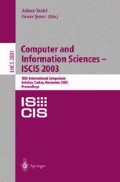Abstract
We show how the notion of relational diagram, introduced by Schmidt, can be used to give a single demonic definition for a wide range of programming constructs. Our main result is Theorem 1, where we show that the input-output (I/O) relation of a compound diagram is equal to that of the diagram in which each sub-diagram has been replaced by its input-output relation. This process is repeated until we obtain elementary diagrams to which we apply the results given in previous work. This is achieved by using monotypes and residuals.
Access this chapter
Tax calculation will be finalised at checkout
Purchases are for personal use only
Preview
Unable to display preview. Download preview PDF.
References
Backhouse, R.C., Hoogendijk, P., Voermans, E., van der Woude, J.: A Relational Theory of Datatypes. Research report, Department of Mathematics and Computer Science, Eindhoven University of Technology, The Netherlands (1992)
Backhouse, R.C., van der Woude, J.: Demonic operators and monotype factors. Mathematical Structures in Computer Science 3(4), 417–433 (1993); Also: Computing Science Note 92/11, Dept. of Mathematics and Computer Science, Eindhoven University of Technology, The Netherlands (1992)
Backhouse, R.C., Doornbos, H.: Mathematical induction made calculational. Computing Science Note 94/16, Dept. of Mathematics and Computer Science, Eindhoven University of Technology, The Netherlands (1994)
Berghammer, R.: Relational specification of data types and programs. Technical report 9109, Fakultät für Informatik, Universität der Bundeswehr München, Germany (September 1991)
Berghammer, R., Schmidt, G.: Relational specifications. In: Rauszer, C. (ed.) Algebraic Logic, Banach Center Publications, 28, Polish Academy of Sciences (1993)
Berghammer, R., Zierer, H.: Relational algebraic semantics of deterministic and nondeterministic programs. Theoretical Computer Science 43, 123–147 (1986)
Brink, C., Kahl, W., Schmidt, G. (eds.): Relational Methods in Computer Science. Springer, Heidelberg (1997)
Chin, L.H., Tarski, A.: Distributive and modular laws in the arithmetic of relation algebras. University of California Publications 1, 341–384 (1951)
Conway, J.H.: Regular Algebra and Finite Machines. Chapman and Hall, London (1971)
Desharnais, J., Möller, B., Tchier, F.: Kleene under a demonic star. In: Rus, T. (ed.) AMAST 2000. LNCS, vol. 1816, pp. 355–370. Springer, Heidelberg (2000)
Desharnais, J., Belkhiter, N., Sghaier, S.B.M., Tchier, F., Jaoua, A., Mili, A., Zaguia, N.: Embedding a demonic semilattice in a relation algebra. Theoretical Computer Science 149(2), 333–360 (1995)
Dilworth, R.P.: Non-commutative Residuated Lattices. Trans. Amer. Math. Sci. 46, 426–444 (1939)
Mili, J.D., Mili, F.: Relational heuristics for the design of deterministic programs. Acta Informatica 24(3), 239–276 (1987)
Schmidt, G.: Programs as partial graphs I: Flow equivalence and correctness. Theoretical Computer Science 15, 1–25 (1981)
Schmidt, G., Ströhlein, T.: Relations and Graphs. EATCS Monographs in Computer Science. Springer, Berlin (1993)
Tchier, F., Desharnais, J.: A generalisation of a theorem of Mills. In: Proceedings of the Tenth International Symposium on Computer and Information Sciences, ISCIS X, Turkey, October 1995, pp. 27–34 (1995)
Tchier, F.: Sémantiques relationnelles démoniaques et vérification de boucles non déterministes. Ph. D. thesis, Département de mathématiques et de statistique, Université Laval, Canada (1996), http://auguste.ift.ulaval.ca/desharn/Theses/index.html
Tchier, F., Desharnais, J.: Applying a generalization of a theorem of Mills to generalized looping structures. In: Science and Engineering in Software Development. A recognition of Harlan D. Mills’ Legacy, Los Angeles, CA, pp. 31–38. IEEE Computer Society Press, Los Alamitos (1999)
Author information
Authors and Affiliations
Editor information
Editors and Affiliations
Rights and permissions
Copyright information
© 2003 Springer-Verlag Berlin Heidelberg
About this paper
Cite this paper
Tchier, F. (2003). Demonic I/O of Compound Diagrams Monotype/Residual Style. In: Yazıcı, A., Şener, C. (eds) Computer and Information Sciences - ISCIS 2003. ISCIS 2003. Lecture Notes in Computer Science, vol 2869. Springer, Berlin, Heidelberg. https://doi.org/10.1007/978-3-540-39737-3_22
Download citation
DOI: https://doi.org/10.1007/978-3-540-39737-3_22
Publisher Name: Springer, Berlin, Heidelberg
Print ISBN: 978-3-540-20409-1
Online ISBN: 978-3-540-39737-3
eBook Packages: Springer Book Archive

